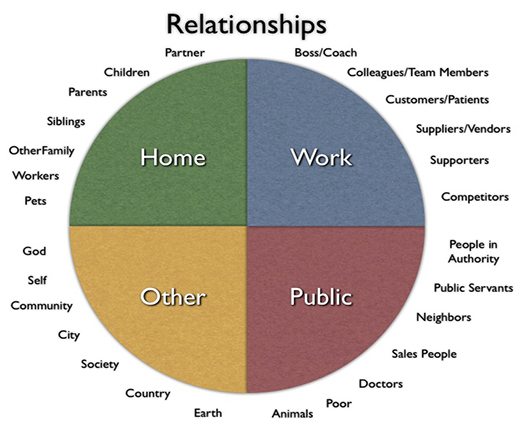Life
5 Easy Tips For Cultivating Relationships That Matter
Relationships are important, aren’t they? Everyone knows this. Having key relationships is important whether you are a professional rising within the ranks of your organization, or an entrepreneur who is working to grow their business.
Without cultivating lasting relationships, it becomes almost impossible to achieve the success you desire. It’s like trying to build a car all by yourself using nothing but a hammer and a prayer. It just won’t work.
The problem? Building relationships isn’t easy. It takes quite a bit of work to develop the connections you need to move forward. However, there are things you can do to cultivate the relationships you need in order to accomplish your goals.
Here are 5 tips to cultivate relationships:
1. Be a helper
Let’s face it, we’re all self interested, aren’t we? Sure, some are more self interested than others, but it’s a trait we all have nonetheless. The bottom line is that people tend to be focused on themselves and their needs.
So what does this mean for you? It means that the more valuable you are, the more relationships you will have. Not only that, the relationships you build will be deeper than most.
In order to become a person of influence, you have to become a person of value. When you find ways to benefit the people you interact with, they will trust you more than those who do not. This means they will be far more likely to help you when you need it.
The great thing about this is that the things you do don’t have to be deep and profound. Even the little things will count. Do you know someone that could help the person you’re talking to? Is there a piece of advice you can give them that will help them achieve something? What if they just need a word of encouragement? Pay attention and see what people need. Whenever you can, be the one to give it to them.

2. Show genuine interest
If you’re like most people, you’re familiar with the phrase “people don’t care how much you know until they know how much you care.” It’s very true. You’ll never be able to form deep relationships with people who don’t believe you care about them.
However, the issue isn’t just being interested in the other person. The issue is showing that you’re interested. One of the best ways to do this is to make sure your conversations are focused on the other person as much as possible. When you show genuine interest in the other person, they will see that you’re someone who actually cares about them.
All you need to do is encourage them to talk as much as possible. Here’s 3 steps you should take in your conversations: ask them a question. When they answer make a short comment about their response. Then, ask another question. Wash, rinse, repeat. You can do this for as long as the conversation continues. When you do this, you will see how much of a difference it makes in your conversations.
3. Keep your promises
Nobody likes people who make promises that they fail to deliver on. When you say you are going to do something, do it. However, this doesn’t mean you have to be perfect. There are going to be times when you’re legitimately unable to do something that you thought you would be able to do. It happens to everyone.
Maybe you expected that you would be able to do something, so you committed to it. Then circumstances beyond your control prevented you from doing it. If this happens, apologize quickly and explain the situation. Take responsibility. If you’re someone who usually does what they say, the other person will be more likely to forgive you.
“A promise made is a debt unpaid.” – Robert W. Service
4. Make people feel important
One of the main needs we have as people is the need to feel important. Everyone wants to feel a sense of significance. We need to know that the things we do actually matter. It’s one of the reasons people become resentful when we feel that people aren’t appreciating us.
That’s why you need to make people feel important as often as you can. It’s pretty easy, really. You can do this by expressing true gratitude when they do something for you. You can give them sincere compliments when you notice their positive attributes. These are some simple things you can start doing today.
5. Don’t be afraid of vulnerability
One of the biggest obstacles that some people have is that they appear to be perfect. You know exactly who I’m talking about. That guy at the networking event who doesn’t seem to have a single flaw. They are so far above us mere mortals that we find it hard to connect with them.
Even though you know these people are just as human as everyone else, but there’s absolutely no outward evidence of it. If you want to build great relationships, don’t be this person. If you want to avoid this, you need to be more vulnerable.
Being vulnerable means letting other people see some of your flaws and weaknesses. Of course, I’m not suggesting that you spill your guts about every single failure and mistake you have ever made. I’m just saying that it’s okay to show that you’re human. You can do this by poking a little fun at yourself. Self deprecating humor goes a long way if you don’t overdo it. Also, if the situation allows, you can tell stories about times when you made mistakes or failed. Again, if you don’t overdo it, you will become more relatable to others.
“We have to nurture our young women and understand the beauty and the strength of being a woman. It’s kind of a catch-22: Strength in women isn’t appreciated, and vulnerability in women isn’t appreciated. It’s like, ‘What the hell do you do?’ What you do is you don’t allow anyone to dictate who you are.” – Jada Pinkett Smith
Relationships are critical to your success. You need strong relationships that benefit both you and the people you’re interacting with. When you have these types of relationships, you can go as far in your career as you want. Do yourself a favor. Start putting these tips into action. You will see how huge of an impact it can have.
How do you cultivate your relationships? Please leave your thoughts in the comment section below!
Life
Imposter Syndrome Is Rooted in Your Past But Here’s How You Can Rewire It
Imposter syndrome is most prevalent in highly successful women

Imposter syndrome is “the persistent inability to believe that one’s success is deserved or has been legitimately achieved as a result of one’s own efforts or skills.” (more…)
Life
The Surprising Mental Health Tool You Probably Haven’t Tried
Through journaling, I arrived at a more balanced perspective, it reinstated my sense of gratitude and led me to accept my disability

In two particularly difficult times in my adult life, my journaling practice is helping me heal emotionally. It has been a vital tool for helping me see the bigger picture and land in a place of gratitude. (more…)
Life
How to Stop Comparing Yourself to Others and Find True Happiness
Comparison is the thief of joy; it robs us of our happiness, self-esteem, and peace of mind

In today’s hyperconnected world, it’s easier than ever to fall into the trap of comparing ourselves to others. Social media platforms like Instagram, Facebook, and LinkedIn constantly bombard us with curated highlights of other people’s lives, making it seem like everyone else is happier, more successful, and more fulfilled than we are. (more…)
Life
Harness the ‘Battery Effect’ to Transform Life’s Tensions into Your Greatest Strength
Recharge your life batteries by shifting your mindset today

I believe our life capacity is determined by the skillsets we develop on this spinning rock we call Earth. By “life capacity,” I mean our ability to embrace and sustain joy. (more…)
-

 Success Advice4 weeks ago
Success Advice4 weeks agoStephen Covey’s 8 Leadership Habits That Will Change How You Lead Forever
-

 Personal Development4 weeks ago
Personal Development4 weeks agoWant to Change the World? Start by Sharing Your Knowledge
-

 Business4 weeks ago
Business4 weeks ago7 Legal Situations Every Small Business Owner Should Prepare For
-

 Success Advice3 weeks ago
Success Advice3 weeks agoThe One Mindset Shift That Made Me Irreplaceable At Work
-

 Scale Your Business3 weeks ago
Scale Your Business3 weeks agoWhy Smart Entrepreneurs Never Skip This One Business Expense
-

 Success Advice2 weeks ago
Success Advice2 weeks agoHow Playing by the Rules Became the Smartest Business Strategy
-

 Did You Know2 weeks ago
Did You Know2 weeks ago7 Surprising Life Lessons Video Games Taught Me That School Never Did
-

 Success Advice1 week ago
Success Advice1 week agoHow to Build Trust, Kill Micromanagement, and Lead a Team That Thrives






























3 Comments